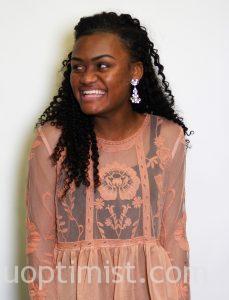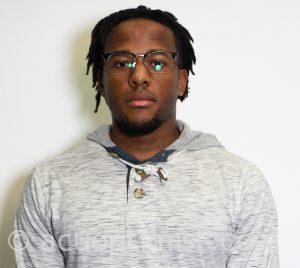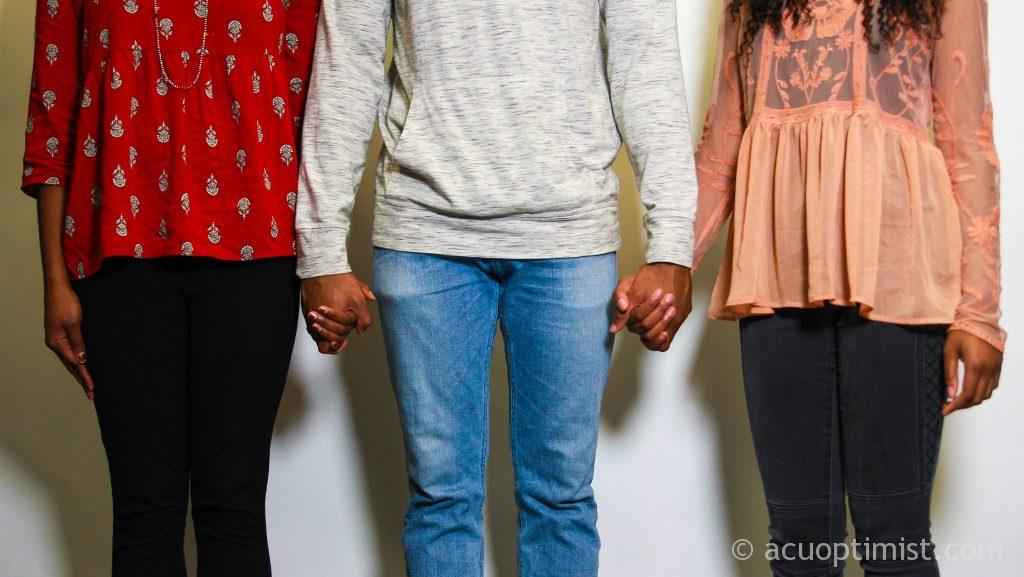On election night 2008, Taylor Crumpton stayed up late with her grandmother, watching election results come in slowly. As a black middle-school student in a primarily white community, most of what she knew about Obama came from her friends who said what their parents said. She said she realized having a black president was important when her grandmother started crying.
On Nov. 4, 2008, for the first time in United States history, the country elected a black president. Crumpton’s grandmother wept until the lights went out in their house.
Then she had a panic attack.
Crumpton said she vividly remembers her grandmother screaming in her panic attack, saying, “The Klan is coming, the Klan is coming.”
Her grandmother, now in her 80s, had suffered racial discrimination throughout her lifetime. Crumpton said the panic attack showed how that discrimination had affected her.
When the lights went on, her grandmother calmed down.
“It’s very beautiful for older generations of African-Americans that experienced Jim Crow and whose childhood was marked by segregation and discrimination and inferiority,” Crumpton said. “To see an African-American person be elected to the highest office in the land was just a beautiful thing.”
Crumpton, senior social work major from Oakland, California, and other students started their adolescent years at the same time the U.S. elected its first black president. Unlike people in other generations who grew up with white presidents, these students came of age with a black president. Summer Thompson, sophomore communication major from Missouri City, and Micah West, junior biology major from Grand Prairie, also felt the effect of a black president on their most formative years but saw him in different ways.

Senior Taylor Crumpton, social work major from Oakland, California.
Eight years after she saw Obama’s election, Crumpton takes a passionate interest in politics, participating in Students’ Association and College Democrats and traveling to Washington D.C. as a featured speaker for the Whole Women’s Health vs. Hellerstedt U.S. Supreme Court case about abortion and women’s rights. She said seeing a black family in the White House encouraged her.
“To see this Ivy-League-educated family enter into that office switched so much of the stereotypes that have been made about the African-American community,” Crumpton said.
Crumpton grew up in an impoverished home because her mother lived on disability aid. Although she experienced racial discrimination at a primarily white school district in Coppell, Crumpton did not become a passionate advocate of her race until she was a sophomore in college and heard about the shooting of Michael Brown in Ferguson, Missouri. She studied the event and followed different Twitter accounts so closely she later became friends with social justice advocates she met on Twitter. She imagined her younger brother’s face as the face of the dead boy.
“I remember when the verdict got out,” Crumpton said. “It was ‘Not Guilty.’ And I felt like my whole entire world had shattered.”
Crumpton said while some people blame Obama for the heightened violence in race relations during his presidency, she thinks the rise of social media played a bigger role. Since 2008, minorities have had a stronger voice through social media, so Crumpton said they have been able to take a national stand against injustice. While she doesn’t think Obama was perfect, she said he could be an example for black children.
As the highest office and greatest authority in the land, the U.S. president can have a powerful effect on young people, said Dr. Suzie Macaluso, associate professor of sociology.
“When you think about what your potential is in life, where you see yourself going, if you’ve never seen anyone doing that, it’s hard to imagine yourself getting there,” Macaluso said. “It’s important for people to see someone like that in positions of power.”
The president’s family and First Lady also have an effect on young people, Macaluso said. A “self-fulfilling prophecy” happens when people picture themselves succeeding only as much as the people they look up to.
“There’s that sense of, ‘If he can make it, maybe I can make it,’” Macaluso said.
Students who came of age in the last eight years have seen the president move into popular culture through social media, memes, Vines and more. Macaluso said younger age groups see the Obama family in late night talk shows or on Twitter, rather than traditional news outlets.
“I think President Obama has been very approachable as a president,” Macaluso said. “He was the first president to have a Twitter account and that made him approachable in a whole new way.”

Sophomore Summer Thompson, communication major from Missouri City.
Thompson approached Obama by attending his second inauguration in January 2012. Through the Close Up program, an education initiative to help high school students engage in politics, she was able to attend the inauguration during her sophomore year of high school.
The youngest of five children, Thompson said she surprised her parents with her desire to be a leader and her passion for service. She already had the personality of a leader, but the election of a black president inspired her to be more politically aware.
When Obama was first elected, Thompson, at 11 years old, felt upset because she wasn’t old enough to vote for the first black president. His election exposed her to politics, she said, both through learning from and talking to her peers. She said Obama could represent everyone who is underrepresented in this country.
“For many years it was kind of like ‘will there ever be?’ and now the answer came true ‘there can be,’” Thompson said. “He can do a lot for a lot of people.”
As a student council member in high school, Thompson started several ethnic programs including a Black History Month program and a Cinco de Mayo celebration. In college she serves as the member liaison for the Black Students Association and said she “runs a tight ship.” Her goals for BSA include education, image, academics and activism.
“It’s not fair for our ancestors to have dedicated their lives to a certain movement, and us not dedicate our lives to finishing that movement,” Thompson said.
Although Prentice Ashford, director of the Office of Multicultural Affairs, experienced Obama’s election at an older age than these students, he said he also saw Obama as a symbol of what could be accomplished by a black man. He said he was a junior in high school when Obama was elected.
“I remember being in my grandmother’s living room and her crying,” Ashford said. “She never thought the day would come where a black person would hold the highest office in our nation.”
People often stereotype black fathers as being absent, Ashford said, but Obama’s family modeled stable family relationships and broke stereotypes. Yet some people use Obama’s presidency as an excuse for not addressing racial issues. Ashford said some black students tell him about conversations in which people use the first black president to downplay racial issues.
“They say, ‘Obama’s president, so why are you complaining?’” Ashford said.
While students like Crumpton and Thompson see the first black president as an inspiration, other black students don’t feel any more connection to Obama than other presidents.
In Obama’s 2008 victory speech, he made several references to Martin Luther King Jr. and many saw his election as the realization of King’s dream for equal civil rights in the U.S. But West, BSA president, said Obama was put on a pedestal.
“It was great seeing the first African-American president,” said West. “But there was a lot more put on him than should’ve been. Even at a young age, it never sat with me well.”
But most of West’s peers thought Obama was perfect, West said, and it wasn’t socially appropriate to disagree with the black president.

Junior Micah West, biology major from Grand Prairie.
When he was 12 years old, around the time Obama became president, West met Dr. Ben Carson, a retired neurosurgeon who later ran for president. Carson came to West’s church and taught a sermon about the complexity of the human eye.
“Hearing him talk kind of stuck with me at that age,” West said. “I just wanted to be a lot like him.”
Born in New Jersey, West grew up moving a lot until his family settled down in Grand Prairie. He lived in the suburbs, his dad working as a personal trainer and his mom working as a nurse. West said they taught him if he worked hard enough, anything could be possible.
“Knowing how I’m wired, I think my parents could’ve told me, ‘Just go along with the system,’ and I still would’ve been like, ‘No, I’m gonna fight this,’” West said. “You personally play a huge role in how you act being black.”
West attended a diverse high school, even though it only had 600 students, so in college he experienced culture shock because, for the first time, most of his friends were white. He said he learned from his white friends, but felt misunderstood by them at times. BSA helped him find close friends in the black community on campus so he said he wanted to continue building that community by being the association president.
“I wouldn’t say Obama played any role in my motivation for life,” West said. “I already had the idea that I could make it far.”
Crumpton, Thompson and West agree Obama did not solve problems with race relations, but he did provide an example to the students who grew up under his presidency. The first black president became a symbol of what could be achieved by a black man in a country where black people were formerly enslaved, Crumpton said.
Thompson witnessed Obama’s second inaugural address when she was in high school. She said she woke at 3 a.m. on January 21, 2013, and didn’t get a chance to do her hair. She and a few other girls in the Close Up program rushed to put on warm clothes but they didn’t have time to get really bundled up before they left to catch the Metro to the Capitol.
She put glove warmers in her gloves while other students drank hot chocolate to keep warm. They wore matching red hats so they could find each other. They stood in a spot near the middle of the crowd and waited in the cold to hear Obama speak.
“We didn’t get a good spot to see him clearly,” Thompson said. “But we could see him.”
And maybe, through him, her generation can see themselves.

